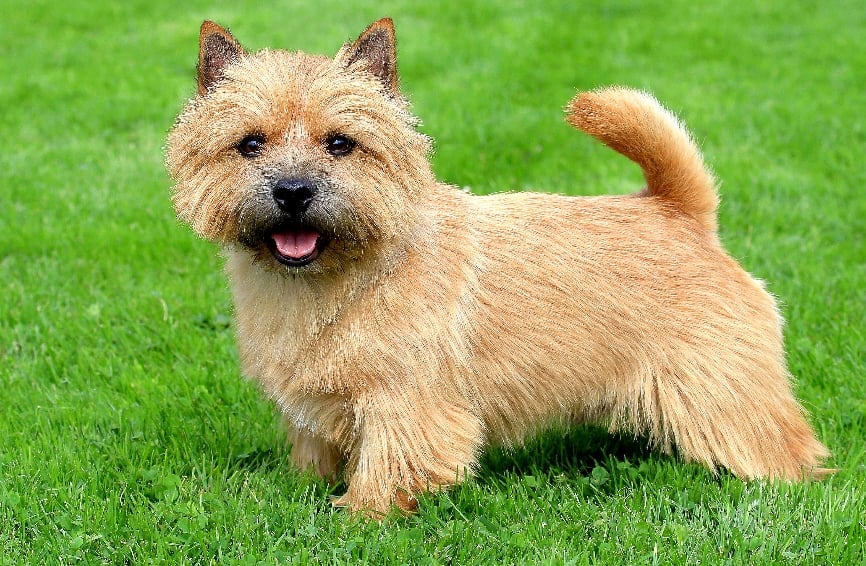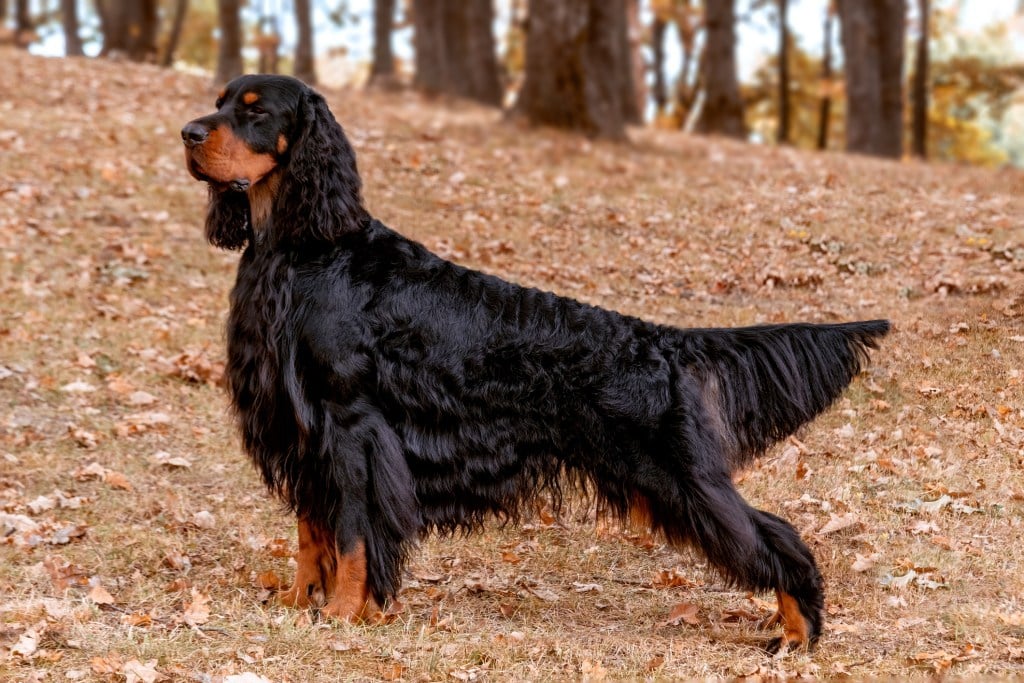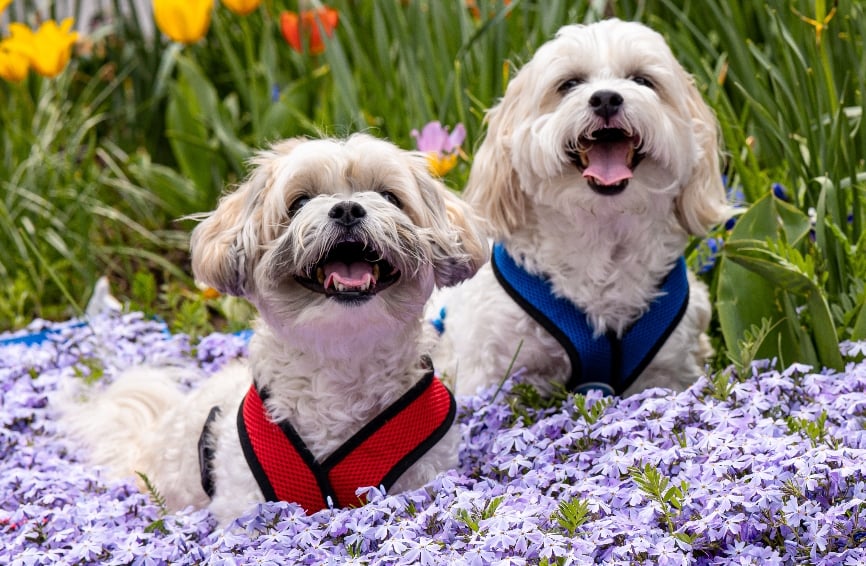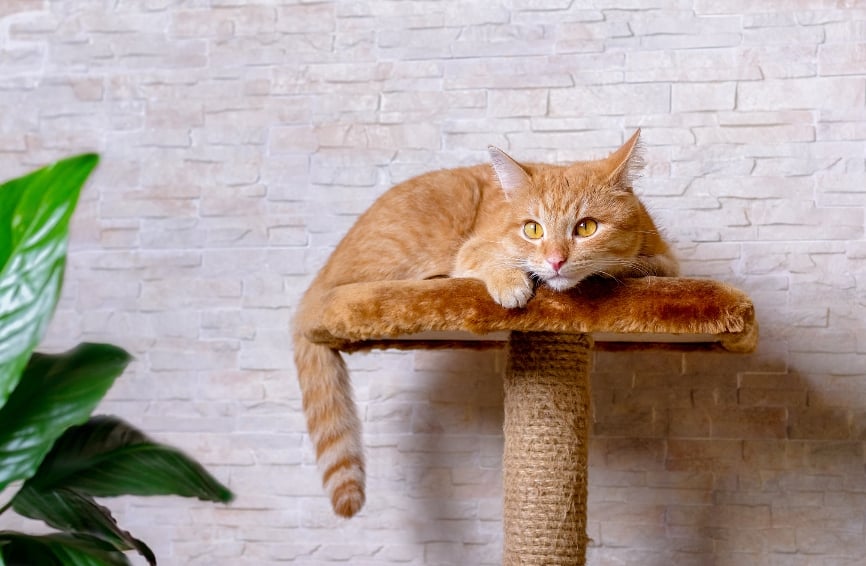Table of Contents
Introduction to Yorkshire Terriers
Known for their luxurious coats and compact size, the Yorkshire Terrier is a classic dog breed that’s feisty and fun. Yorkshire Terriers (or Yorkies for short) are one of the most popular dog breeds in America and loved for their affectionate temperament and low-allergen qualities. If you’re looking for a lapdog with a lot of personality, a Yorkshire Terrier might be perfect for your household.
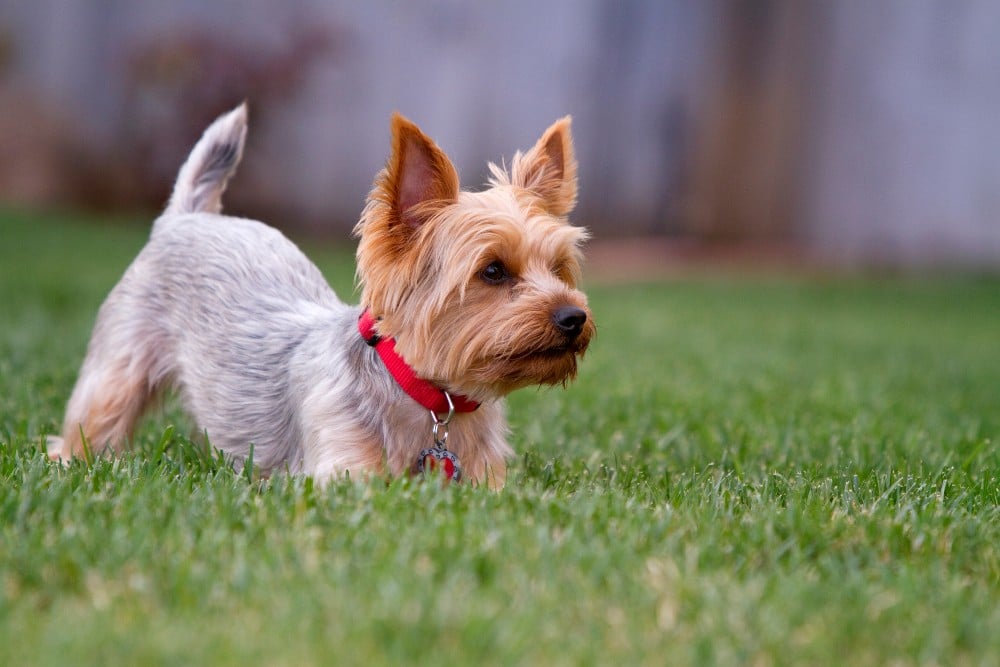
Size of Yorkshire Terriers
Yorkshire Terriers are small dogs that are only up to seven pounds in weight when fully grown. Their size makes them perfect for city life and able to thrive in small spaces that are close to their human companions. Because of their small size, there is not a lot of difference between the weights of males and females, which is something that sets Yorkies apart from other types of dogs.
Here’s how big you can expect your Yorkie to get based on age.
| Weight Chart | Birth | 3 months | 5 months | 12 months |
|---|---|---|---|---|
| Male and Female Yorkshire Terriers | 2.5 ounces | 1-2.5 pounds | 1.5-4 pounds | 3-7 pounds |
When fully grown, a Yorkshire Terrier will be about eight to nine inches tall.
Characteristics of Yorkshire Terriers
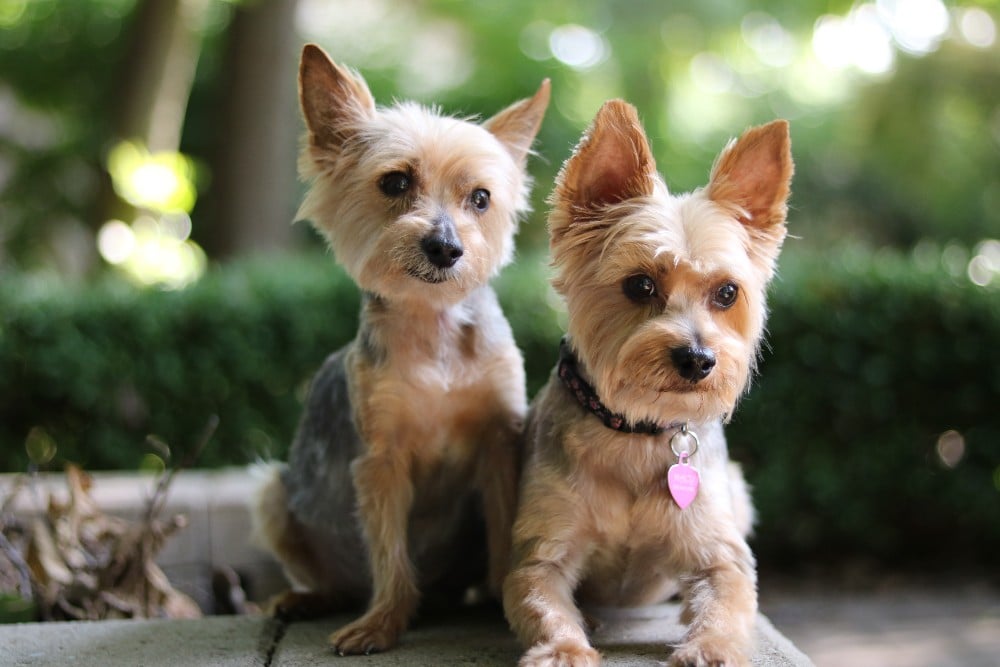
Yorkies have a history of being the companions of royalty and a personality to match. These dogs tend to act a bit full of themselves and are stylish additions to any household. Although these dogs are tiny, they are adventurous and on the lookout for trouble. They are known to bark at intruders yet be very loving and cuddly with family members. Yorkies have a bit of a reputation for barking a lot, but this issue can be solved with proper training and rewards for good behavior.
As you get to know a Yorkshire Terrier’s personality, here’s what you can expect based on his or her breed characteristics.
| Breed Characteristic | Level (High, Medium, Low) |
|---|---|
| Affectionate with People | High |
| Good with Kids | Medium |
| Good with Pets | Medium |
| Need for Exercise | Medium |
| Energy Level | High |
| Intelligence Level | Medium |
| Able to Be Trained | Medium |
| Amount of Barking | High |
| Amount of Shedding | Low |
Something else to know about Yorkshire Terriers is that they are temperature-sensitive, so it’s best to keep them indoors when it is hot or cold outside. They are wonderfully playful but require only a small amount of space to get exercise.
It’s best to train Yorkies early to prevent them from being aggressive toward unknown dogs. Training can also help Yorkies to not bark too excessively and to have confidence in their own abilities rather than being babied too much because of their cute appearance and small size.
History of Yorkshire Terriers
The Yorkshire Terrier has a history that dates back to the mid-1800s when Victorian-era ladies loved having lapdogs to keep them company. They originated from the Northern English countries of Yorkshire and Lancashire, hence the dog’s regionally specific name. Scottish weavers who migrated to this region are credited with creating this breed, which has working-class roots despite its popularity among royalty. That’s because these dogs were small enough to seek out rodents in the textile mills and even in coal miles back in the day!
But when the Yorkie was recognized by the Kennel Club in England in 1886, the breed got a lot of publicity and popularity, which transformed them into fashionable ladies’ companions. Yorkies made their way to America in the 1870s and have been a household name here for many years ever since then.

Yorkshire Terrier Standard Information
As a breed of dogs that is recognized by Kennel Clubs, there are specific standards that a Yorkie must adhere to in order to be a pure Yorkshire Terrier. These include physical characteristics that give this dog a self-important vibe and a parted coat that hangs down the sides of the body.
Here is an overview of the breed standard information for Yorkshire Terriers.
Head:
- Small and flat on top without being too round
- Bite neither undershot or overshot
- Small, V-shaped ears
- Medium-size eyes that are dark in color
- Black nose
Neck, Topline, Body:
- Very compact and well-proportioned body
- Short back with level backline
- Medium-length tail carried higher than level of back
Forequarters and Hindquarters:
- Straight forelegs with elbows neither in or out
- Straight hindlegs with moderately bent stifles
Coat:
- Glossy, fine, and silky texture
- Trimmed to floor-length for neat appearance
- Long hair on muzzle
- Trim hair short on tips of ears and feet
Color:
- Black and tan for puppies
- Dark steel-blue, not silver-blue
- Tan hair darker at roots than in middle
- Tail hair is darker blue, especially at the end
- Tend to become lighter as they age
Gait:
- Smooth movement that looks like gliding across the floor
Caring for Yorkshire Terriers
Most Yorkies are pretty easy to care for and are definitely household dogs that prefer being indoors in a controlled temperature rather than outside in extreme weather. Here are some general tips for taking the best care of a Yorkshire Terrier.
Best Living Environments:
- Apartments and small living spaces are fine
- Environments with plenty of daily human contact
- Not left alone all day
- Kept away from young children who might handle them too roughly
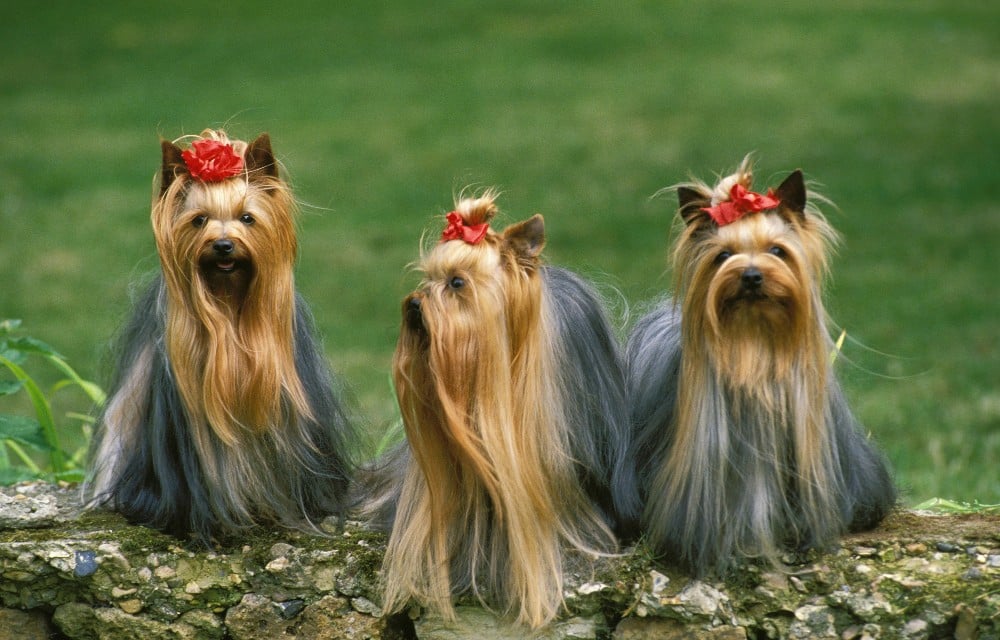
Type of Exercise:
- Walks around the block
- Learning tricks in the house
- Simple agility training in a backyard
Mental Enrichment:
- Squeaky toys for entertainment
- Fetching toys for playtime
- Quality lap time with loved ones
Training Strategies:
- Can be challenging to housetrain and be prone to accidents
- Offer treat rewards for going to the bathroom outside
- Can puppy-pad train Yorkies for bathroom breaks during very hot or cold weather
Grooming Tips:
- Grooming requires significant commitment and attention
- Brush the coat daily to prevent matting
- Bathe weekly to maintain the coat
- Trim nails after baths
Common Health Problems of Yorkshire Terriers
Yorkshire Terriers are generally healthy dogs, but that doesn’t mean you can skimp on preventive care and daily routines. If you choose to buy a Yorkie puppy from a breeder, choose a responsible breeder who will provide health clearances from the puppy’s parents and ease your mind about your pup’s genetic makeup.
These are some of the most common health issues that arise with Yorkshire Terriers.
- Patellar luxation (dislocated kneecaps) due to genetic misalignments of the legs or trauma
- Degenerative eye conditions like progressive retinal atrophy
- Hypoglycemia (low blood sugar)
- Collapsed trachea with a chronic cough
- Portosystemic shunt (irregular blood flow between liver and the rest of the body)
- Dental disease
In addition to these potentially serious medical conditions, you’ll also want to have your Yorkie regularly checked out for dental issues and eye infections. Reverse sneezing is common in Yorkies as well, which can be unsettling but is usually harmless.
Because of their small size, Yorkies are somewhat fragile and do best with supervision to ensure they don’t accidentally injure themselves. Leg fractures are quite common among Yorkshire Terriers due to falling off of things or being stepped on by someone who doesn’t see them on the ground.
The life expectancy of a Yorkshire Terrier is about 13 to 16 years, which is longer than some other breeds of dogs. You can enjoy many years with your Yorkie by taking your pet to regular vet checkups and monitoring any health issues from the earliest possible time.
Diet and Nutrition for Yorkshire Terriers

Compared to other dog breeds, Yorkies have more sensitive digestive systems and might be picky eaters. These dogs are prone to teeth and gum problems, which can make eating more challenging as well.
Good ingredients to look for in Yorkie food include:
- Turkey
- Fish
- Lamb
- Chicken
- Beef
- Sweet potatoes
- Brown rice
- Fish oil
You can either buy commercially-produced dog food for your Yorkshire Terrier or make your own DIY dog food at home with a veterinarian’s approval. It is not recommended to give your Yorkie bites of food from your dinner plate because this habit can cause your dog to become overweight over time. Also, table scraps can be high in fat, which can cause serious digestive issues, such as pancreatitis (inflammation of the pancreas) in dogs.
Yorkies typically eat between ½ and ¾ cup of dog food per day that is divided between meals. However, your dog may eat a bit less or more depending on age, size, and activity level. A moderately active Yorkie needs about 150 calories per day, while a larger or more active Yorkie could eat 200 or more calories a day and be healthy. To aid digestion, it may work best to divide meals up into about four feedings per day rather than just two larger meals.
Your vet can advise you on the proper amount of food that your Yorkie should eat per day, given your pup’s specific health needs.
Where to Adopt or Purchase Yorkshire Terriers
The American Kennel Club has an AKC Marketplace PuppyFinder to help you search for Yorkshire Terrier puppies that come from registered litters and reputable breeders. Responsible breeders should be able to provide you with health certificates from both of the puppy’s parents that show they are free of eye diseases and have normal knees.
There are also many Yorkies and Yorkie mixes that are in need of adoption. A few adoption resources to look into if you are interested in this type of dog are Rescue Me Yorkie Rescue, United Yorkie Rescue, and the Yorkshire Terrier National Rescue, Inc. Be aware that Yorkshire Terriers are often adopted very quickly at local animal shelters because of how cute they are. However, they might be turned over to shelters after the death of an elderly owner or due to issues with barking or bathroom accidents in a household if not trained well.
Related Breeds
Since Yorkies have been around for quite a while, many people are familiar with this type of dog. However, there are other breeds that have similar appearances and qualities that you might be interested in as well.
Here are some related breeds to check out if you love Yorkshire Terriers.
- Silky Terrier
- Biewer Terrier
- Maltese
- Scottish Terrier
- Australian Terrier
Pet Insurance for Yorkshire Terriers
The small but mighty Yorkie needs your care and protection, which is why pet insurance is a great idea for Yorkshire Terriers. Healthy Paws offers dog insurance for Yorkshire Terriers to cover everything from accidents to illnesses, cancer, emergency care, genetic conditions, and alternative care. With one of our pet health plans, you can give your Yorkie the care he or she needs without having to think twice about unexpected medical bills.
We offer fast, easy, and worry-free claims and cover visits to any vet or emergency clinic in the U.S. Contact us to learn more about our Yorkie health insurance plans and give the gift of good health to your best canine friend.



